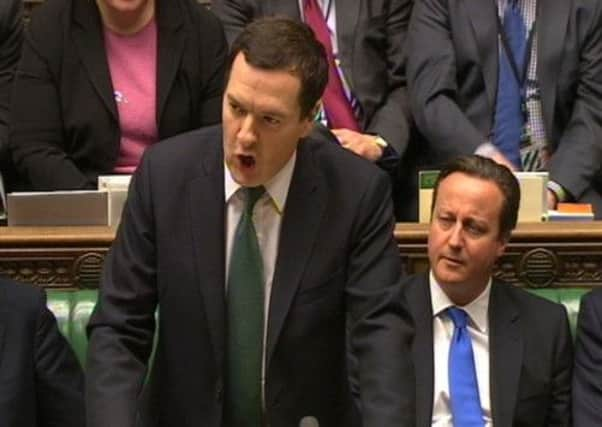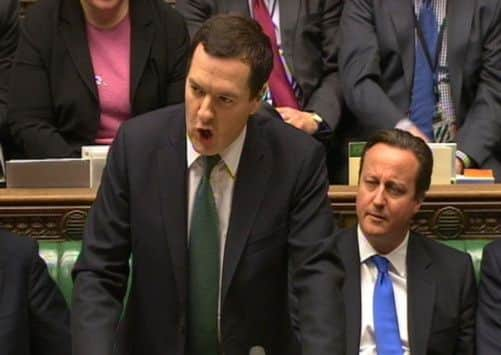Budget: UK outpacing Germany and US, says Osborne


In a highly political speech in which he taunted his opposite number Ed Balls over Labour’s previous warnings of a double-dip recession, the Chancellor declared that Britain was now outpacing France, Germany and the US in the road back from the financial crash.
The Office for Budget Responsibility (OBR) yesterday declared that growth this year would be 1.4 per cent, more than double its previous estimate, and would then hit 2.4 per cent in 2014.
Advertisement
Hide AdAdvertisement
Hide AdBut, with an eye on the 2015 general election, Mr Osborne tempered his optimism on the economy, insisting that the “job is not yet done”.


In a worrying parallel with the boom years of the early noughties, the OBR report said that much of the welcome growth seen over the last few months had come about because shoppers were deciding to save less and spend more, and because the property market was beginning to heat up.
A sustained recovery in the UK economy could only come about once Britain earned its way back to health with higher productivity, the OBR said.
Mr Osborne also conceded that the prospect of an export-led recovery was still distant, with exports “not growing as fast as we would like”.
Meanwhile, the OBR also warned that increases in earnings will remain “subdued” right up until 2015, when voters will be going to the polls.
Labour said last night, as a result of the failure of wages to keep pace with rising costs, families were £1,600 worse off than when the Conservative-Lib Dem coalition came to office in 2010.
But the OBR’s main finding was to register the surprise surge in Britain’s previously flatlining economy this year, which helped Mr Osborne make his case yesterday. The extra growth helped ensure that the public deficit would be £8.6bn less this year than previously expected, it concluded.
Yet with real incomes failing to grow, the OBR concluded that the return of High Street confidence may not be sustained through 2014.
Advertisement
Hide AdAdvertisement
Hide AdDespite the uncertain picture, the OBR concluded that Britain’s jobs market would continue to improve over the next few years, with unemployment due to fall to 7 per cent in 2015, and then to 5.6 per cent by 2018.
On the deficit, the OBR report confirmed that the huge sums which have been borrowed in recent years following the financial crash of 2008 and 2009 will leave a massive long-term legacy.
This year alone, the OBR estimates, the gap between what the government spends and raises in revenue will hit £111.2bn.
It means that the total national debt – which is on track to hit £1.5 trillion – “will peak at more than double its pre-crisis level” before beginning to fall in 2016-17, the OBR added.
Mr Osborne said yesterday that, with those figures in mind, he would continue to target government spending if re-elected in 2015.
Yet Mr Osborne warned that if he was still in charge at that point, he would not let up on public spending cutbacks even if the country was moving back into the black.
Even then, he said, Britain’s “broken public finances” would require repair work. He added: “And so the single most important economic judgment I make today is this: We will not let up in dealing with our country’s debts. We will not spend the money from lower borrowing.”
Opinion was split on Mr Osborne’s long-term strategy last night. Phil Orford, chief executive of small business organisation The Forum of Private Business, said that whichever government was in charge at that point would have little choice but to prioritise paying down the legacy of debt left by the financial crisis.
Advertisement
Hide AdAdvertisement
Hide AdBut Emran Mian, of the Social Market Foundation think-tank, said that Mr Osborne should consider investing.
He said: “Even with just the £13bn surplus being targeted in 2017-18, we could treble science research funding, treble adult skills funding or introduce universal childcare – and still have money left over.”
SEE ALSO